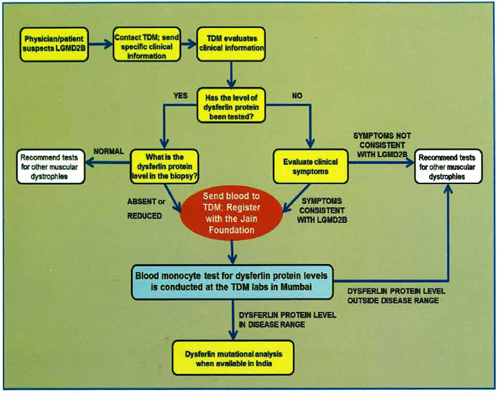
Molecular and genetic analysis of debilitating inherited diseases
Genetic screening in case of some major inherited disorders become more significant if these disorders cannot be cured. The management of such patients will solely depend upon the extend of clinical symptoms expressed by such patients. In such instances, genetic screening can not only distinctively identify the extent of genetic changes but also predict the pattern of progression of the disease. Such genetic screening analysis can be performed for other genetic disorders like Limb Girdle Muscular Dystrophy(LGMD), Spinal Muscular Dystrophy(SMD), Fragile X syndrome, Autism etc.
The genetic screening experiments are specialized tests that can be performed with blood samples from the patient. Though the experimental protocols for the analysis can be performed in well-equipped laboratories, the analysis becomes useful only after the results are suitably interpreted by experts. Therefore, such analysis cannot be performed like routine pathology laboratories which make these analyses costly and time consuming.
Shikshana Parasraka Mandali’s Institute for Advanced Training and Research in Interdisciplinary Sciences (IATRIS),Sion, Mumbai has been carrying out such analysis since more than Two decades.
The services prov ped many clinicians treating neuro-muscular disorders to support and manage their patients better. The services are being used by patients from all over India. Being an Institute managed by an Educational Trust, the tests are provided at reasonable costs with special concession extended to patients from Municipal and Government hospitals. Over these years, the Institute has built a database of patients with Muscular Dystrophy especially, from the western region of our country. The Institute wishes to consolidate the services rendered by upgrading the Institutional technical infrastructure so that contemporary more advanced genetic analysis protocols can be implemented.
Past experience of team at Department of Molecular Biology- IATRIS, Sion, Mumbai
Studies on DMD / BMD
Amongst the most frequent myopathies in all populations are the Duchenne /Becker muscular dystrophies ( DMD / BMD). The distribution of deletions within the dystrophin gene of DMD / BMD patients has been studied, using multiplex pcr techniques and recently with MLPA. These studies are carried out in very few laboratories in india. A total of approximately over 1150 samples of clinically suspected cases of DMD / BMD have been analyzed by multiplex PCR methods, by our group over a period often years. Approximately 71% of patients showed deletions of one or more exons. 29% of patients did not show any deletions in the 32 exons covered inspite of showing strong clinical features suggestive of DMD / BMD. Some of the patients showing no deletions were taken clinical features suggestive of DMD / BMD. Some of the patients showing no deletions were taken for MLPA(Multiplex Ligation-Dependent Probe Amplification).
Mlpa (Multiplex Ligation-Dependent Probe Amplification) have revived interest in the detection of deletions and duplications, and carrier status in females primarily due to the simplicity and flexibility of this methodology. In MLPA, probes (not DNA) added to the samples are amplified and quantified. Hence, is considered as the method of choice for initial DNA analysis.
In our studies, covering western india no apparent correlation was seen between the size and location of the deletion and the severity of the disorder. Further deletion studies have been undertaken to analyze translational frame shift hypothesis and its significance in the progression of the disease (Dastur et.al, 2008).
SMA studies
A total of 380 samples of clinically suspected cases of SMA have been analyzed by PCR-RFLP and mPCR methods, by our group over a period of eight years.
Consolidated results of all the samples including details

